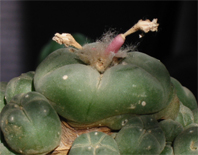
David Marbain, roadman with the Native American Church, sings while holding a peyote fan and gourd rattle
I'm not into the details of US legislation but (naively?) thought that members of the Native American Church have the right to both possess and use peyote as an integral part of their religious ceremonies.

Assemblage of a water drum
But apparently this is not always the case as documented by the Press Democrat's report on NAC roadman David Marbain's struggle to get his seized peyote returned:
A minister in the North Coast chapter of the Native American Church says his right to religious freedom was violated when sheriff's deputies seized mind-altering peyote from his home during a raid on indoor pot gardens.
Former Santa Rosa resident David Marbain, 56, is seeking the return of nearly 5 pounds of the dried cactus known for its hallucinogenic effects as well as 27 live plants that were taken in the 2010 sweep.
Marbain insists it was legal for him to have the natural source of the drug mescaline because it is sacramental medicine that was being used for religious purposes.
He's calling on the Sheriff's Office to give it back so he can continue to use it or dispose of it according to Indian tradition.
“Peyote has been used in Native American rituals for many thousands of years,” said Marbain, who traces his roots to the Mohawk Indians. “It's central to our ceremonies in the Native American Church. It's our sacrament.”
The North Coast chapter of the national organization has about 50 members, church officials said.
But Sonoma County prosecutors are opposing the release, saying the peyote is contraband and not subject to First Amendment protections.
Deputy District Attorney Anne Masterson said in court papers that it is listed as a controlled substance, making its possession and cultivation illegal.
She said it is not exempt because it is viewed by some as religious or sacramental.
“To return the peyote to the defendant or anyone, even a holy person from his tribe, would be improper, as it would be a court-sanctioned violation of the laws of the state,” she said in opposition papers filed in February.
However, Marbain's lawyer, Omar Figueroa, argued the seizure is a violation of Marbain's rights because of his membership in the church, founded about a century ago in Oklahoma. Members practice Peyotism, which they believe puts them in touch with a holy spirit or deity.
Figueroa pointed to case law that suggests prosecutors must demonstrate a “compelling state interest” for infringing on his freedom of religion.
“There is little potential societal harm in using peyote in a religious ceremony conducted in a controlled, supervised environment,” Figueroa said. “Indeed, the Native American Church has been practicing these ceremonies for decades.”
Marbain and church members are expected to attend an April 18 hearing before Judge Ken Gnoss to decide the matter.
Marbain and nine other people, including his wife and adult son, were arrested in a raid on eight indoor pot growing operations in December 2010.
Deputies seized hundreds of plants, processed marijuana, guns and cash from a suspected network of growers.
They found pot and financial ledgers at Marbain's Gilbert Drive house along with two paper bags of peyote and more than two dozen live peyote plants, prosecutors said.
He was initially charged with 18 felonies, including cultivation of marijuana for sale and using his house to distribute a controlled substance. The charges were dropped in January in a plea bargain in which he admitted one count of possession of concentrated cannabis.
He was sentenced to probation and community service.
Now, the longtime “roadman” or minister with the Native American Church says he wants his peyote back. Like Indians before him, he said he's been using it in rituals across the southwestern United States for years, estimating he's taken peyote “literally hundreds of times.”
“It heightens your awareness and puts you in a mode of prayer,” Marbain said.
He's run into no legal snags until the seizure. Sonoma County officials are “acting out of ignorance,” he said.
But whether the peyote is still good is not clear. A portion of it may have rotted while sitting in the sheriff's evidence locker and may need to be buried in a church-sanctioned ritual, he said.
Allowing the sheriff to incinerate the peyote or just toss it out would be disrespectful, he said.
“We would wish to find a place in nature and give it a proper burial, you might say,” Marbain said.
Photos and text are courtesy of the Press Democrat.



















No comments:
Post a Comment